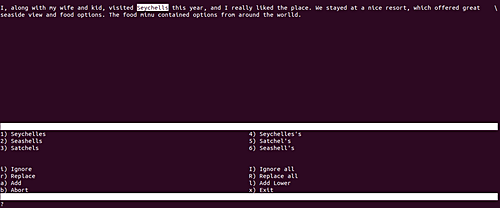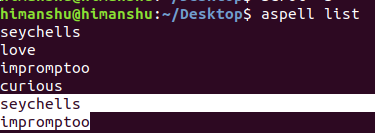Linux aspell初学者命令教程(5个示例)
如果您的工作涉及编写或编辑文本文件或文档,拼写检查器是一个重要的工具。 虽然大多数基于GUI的编辑器都内置了拼写检查功能,但命令行编辑器却无法说明。 但是,有单独的命令行工具可以帮助您进行拼写检查。
在本教程中,我们将讨论一个这样的实用程序,称为aspell 。 但在我们深入研究之前,值得一提的是文章中的所有示例都已经在Ubuntu 18.04 LTS机器上进行了测试。
Linux aspell命令
正如开头已经提到的,aspell命令允许您对文本文件执行拼写检查。 您甚至可以检查单个单词。 以下是它的语法:
aspell [options] <command>
以下是该手册页中有关此工具的说明:
aspell is a utility program that connects to the Aspell library so that
it can function as an ispell -a replacement, as an independent spell
checker, as a test utility to test out Aspell library features, and as
a utility for managing dictionaries used by the library.
The Aspell library contains an interface allowing other programs direct
access to its functions and therefore reducing the complex task of
spell checking to simple library calls. The default library does not
contain dictionary word lists. To add language dictionaries, please
check your distro first for modified dictionaries, otherwise look here
for base language dictionaries <http://aspell.net>.
以下是一些Q&A风格的示例,可以让您更好地了解该实用程序的工作原理。
Q1。 如何使用aspell命令?
aspell的基本用法并不完全是直接的,所以最好得到一个使用摘要,你可以使用'usage'命令选项获得。
aspell usage
以下是您可能获得的输出:
Usage: aspell [options] <command>
<command> is one of:
-?|usage display a brief usage message
help display a detailed help message
-c|check <file> to check a file
-a|pipe "ispell -a" compatibility mode
[dump] config dumps the current configuration to stdout
config <key> prints the current value of an option
[dump] dicts | filters | modes
lists available dictionaries / filters / filter modes
[options] is any of the following:
--encoding=<str> encoding to expect data to be in
--mode=<str> filter mode
-l,--lang=<str> language code
-d,--master=<str> base name of the main dictionary to use
--sug-mode=<str> suggestion mode
Q2。 如何使用aspell检查文件是否存在拼写错误?
这可以使用-c命令行选项来完成。 例如:
aspell -c test.txt
以下是执行上述命令时显示的工具:

因此,您可以看到该工具突出显示了文本中的第一个拼写错误,并在窗口的下半部分提供了它认为我感兴趣的替代选项。 此外,如果仔细观察,还可以选择忽略当前突出显示的拼写错误,替换当前突出显示的单词的所有出现,添加到aspell的字典,并退出此视图。
Q3。 如何使用aspell检查单个单词?
这可以使用-a命令行选项。
aspell -a
一旦运行此命令,它将等待用户输入。 在此模式下键入单词,按Enter键,您将看到aspell在stdout上提供拼写建议。
以下屏幕截图显示了此命令行选项:

Q4。 如何使用aspell来批量检查单词?
您可以使用'list'命令选项。
aspell list
上面的命令在运行时将等待用户输入。 添加任意数量的单词,完成后按Ctrl + D. 然后你会看到aspell会在你提供的输入下方显示拼写错误的单词。
以下屏幕截图显示了此选项:

Q5。 如何控制aspell使用的字典?
aspell的手册页提供了各种选项,可用于控制此命令使用的字典。 以下是一些重要的:
--master=<name>, -d <name>
Base name of the dictionary to use. If this option is specified
then Aspell will either use this dictionary or die.
--dict-dir=<directory>
Location of the main dictionary word list.
--lang=<string>, -l <string>
Language to use. It follows the same format of the LANG envi?
ronmental variable on most systems. It consists of the two let?
ter ISO 639 language code and an optional two letter ISO 3166
country code after a dash or underscore. The default value is
based on the value of the LC_MESSAGES locale.
--size=<string>
The preferred size of the dictionary word list. This consists
of a two char digit code describing the size of the list, with
typical values of: 10=tiny, 20=really small, 30=small, 40=med-
small, 50=med, 60=med-large, 70=large, 80=huge, 90=insane.
结论
您可能会同意aspell是Linux命令行用户应该注意的有用工具。 我们在这里讨论了这个工具的基础知识。 完成这些选项后,请转到命令的手册页以了解有关它的更多信息。








